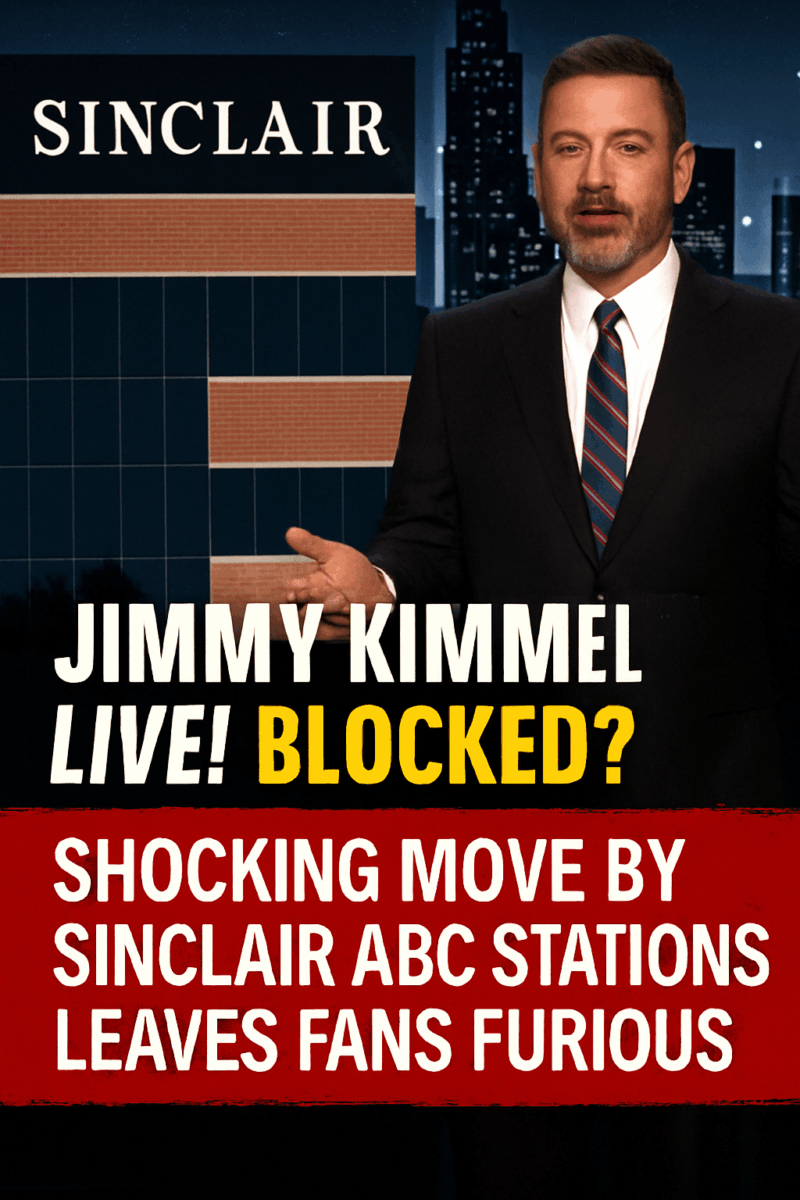Introduction
In a surprising twist that has fans and critics buzzing, Sinclair Broadcast Group, one of the largest owners of local television stations in the United States, has decided not to air Jimmy Kimmel Live! on its ABC-affiliated channels. This shocking move comes just as Jimmy Kimmel triumphantly returned to late-night television after an extended break. While viewers nationwide were eager to watch his comeback, many audiences in Sinclair markets were left disappointed and frustrated. But why would one of the country’s biggest broadcasting companies block such a popular late-night show?
The Unexpected Decision
According to reports, Sinclair-owned ABC stations have chosen not to carry Jimmy Kimmel Live! despite the fact that the program is a staple of the ABC network. For years, Kimmel’s late-night show has been one of the flagship programs for ABC, bringing in strong ratings and viral moments that dominate social media. Fans naturally expected the return episode to air everywhere. However, Sinclair’s decision means millions of households will be cut off from watching Kimmel’s monologues, sketches, and celebrity interviews.
Why Would Sinclair Do This?
The reasoning behind Sinclair’s refusal to air the show has not been officially clarified, but speculation is running wild. Some observers point to Sinclair’s history of making strong editorial decisions and clashing with content that does not align with its broadcasting strategy. Others believe it may be a financial decision, with Sinclair choosing to prioritize local programming or syndicated shows that generate more revenue. Whatever the reason, the lack of transparency has only fueled the backlash.
Fans Outrage Online
Almost immediately after the news broke, angry viewers took to social media to express their frustration. Many accused Sinclair of censorship, while others blasted the company for depriving audiences of one of late-night TV’s most iconic shows. On X (formerly Twitter), hashtags like #LetKimmelAir and #SinclairBoycott began trending as fans demanded answers. Some even threatened to switch to streaming platforms or cut ties with their local ABC stations entirely.
One furious fan wrote: “We waited months for Jimmy Kimmel’s return, and now Sinclair won’t even let us watch it? Unbelievable!” Another added: “This is why people are leaving cable TV. Sinclair doesn’t care about viewers.”
The Bigger Picture
This controversy is more than just a late-night TV issue—it highlights the growing tension between media conglomerates, traditional broadcasting, and the future of entertainment. As more viewers shift to streaming platforms like Hulu, Netflix, and YouTube, the role of local TV stations is changing. By blocking a major ABC program, Sinclair may inadvertently push more viewers toward digital alternatives, further weakening traditional TV’s influence.
Impact on Jimmy Kimmel
For Jimmy Kimmel himself, the situation is awkward. His return episode was highly anticipated, especially given the writer’s strike that had previously shut down late-night shows. Kimmel is known for his sharp political humor, celebrity interviews, and viral comedy sketches that dominate online conversations. By restricting access, Sinclair is effectively reducing his reach and denying him millions of potential viewers. Still, with ABC and Disney backing him, Kimmel will continue to have a strong national platform—just not in Sinclair-controlled markets.
What Happens Next?
At this point, it’s unclear whether Sinclair will reverse its decision or stand firm. Viewer pressure and online outrage may force the company to reconsider. Alternatively, the dispute could escalate, with ABC, Disney, and Sinclair clashing over broadcasting rights and programming obligations. For now, fans in Sinclair markets have only one solution: turn to streaming services or find alternative ways to watch Kimmel’s show.
Conclusion
The decision by Sinclair ABC stations not to air Jimmy Kimmel Live! is a shocking development that underscores the fragile state of traditional television. Fans are outraged, social media is in an uproar, and the broadcasting world is left wondering what comes next. One thing is clear: when a major late-night host returns to TV, but millions of people can’t watch him, the fallout will be loud, viral, and possibly game-changing.


